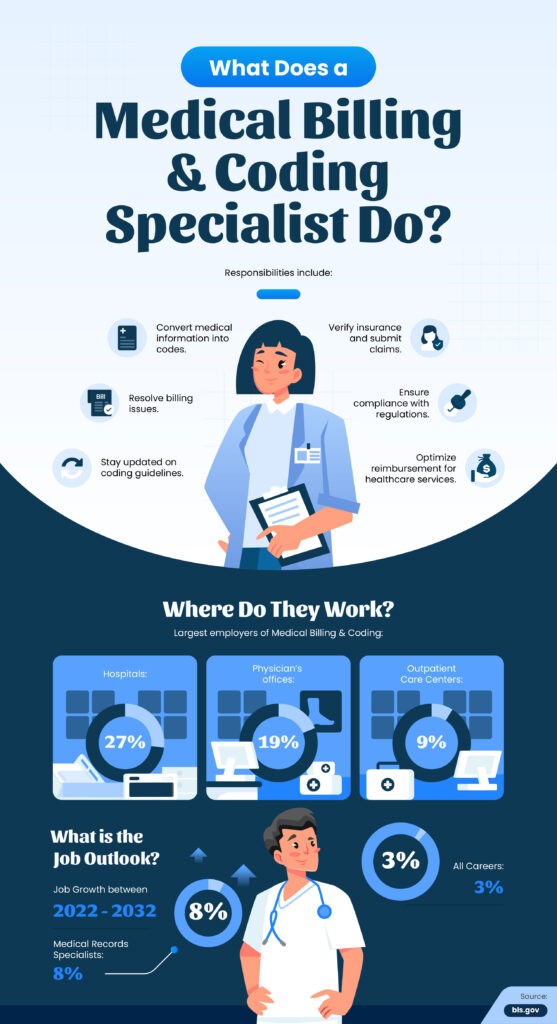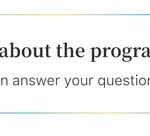Considering a career change or just starting your professional journey? The healthcare sector is often touted for its stability and growth, and within it, medical billing and coding stands out as a field that doesn’t require years of medical school but still offers a fulfilling and in-demand career. If you’re asking yourself, “is billing and coding a good career choice?”, you’re in the right place. Let’s explore the key aspects of this profession to help you make an informed decision.
Why Medical Billing and Coding Could Be a Great Career Path
Medical billing and coding professionals are the backbone of the healthcare revenue cycle. They translate medical procedures, diagnoses, and services into standardized codes that insurance companies and government payers use to process claims and reimburse healthcare providers. This crucial role ensures healthcare facilities receive proper payment for their services, directly impacting their ability to provide patient care. Here are compelling reasons why this field is gaining traction as a solid career option:
Robust Job Outlook and Security
The demand for healthcare services is consistently rising, fueled by an aging population and advancements in medical treatments. This growth translates directly into a strong need for skilled medical billers and coders. The U.S. Bureau of Labor Statistics (BLS) projects an 8% growth in employment for medical records specialists, including billers and coders, from 2022 to 2032. This rate is faster than the average for all occupations, indicating excellent job prospects and solid job security in the foreseeable future. Healthcare organizations will always require accurate and efficient billing and coding to maintain their financial health, making professionals in this field indispensable.
Diverse Work Environments
One of the appealing aspects of medical billing and coding is the variety of work settings available. You’re not limited to a single type of workplace. Professionals can find positions in:
- Hospitals: Working in large hospital systems, handling a high volume and complexity of cases.
- Physician’s Offices and Clinics: Supporting smaller practices, often with a more intimate team environment.
- Specialty Clinics: Focusing on specific areas of medicine like cardiology, oncology, or pediatrics, allowing for specialization.
- Insurance Companies: Reviewing and processing claims from the payer side, offering a different perspective on the billing cycle.
- Billing and Coding Service Companies: Providing outsourced services to various healthcare providers, offering exposure to diverse clients and systems.
- Remote Work: Increasingly, medical billing and coding roles offer remote work options, providing flexibility and work-life balance.
This diversity allows you to choose a work environment that best suits your preferences and career goals.
Entry-Level Accessibility and Career Progression
Medical billing and coding offers a relatively accessible entry point into the healthcare industry. Unlike many clinical roles that require extensive degrees, you can often begin your career with a certificate or associate’s degree. Many vocational schools and community colleges offer focused programs that can be completed in a year or less.
Furthermore, this field offers clear paths for career advancement. Starting in entry-level positions, you can gain experience and specialize in areas like auditing, compliance, or specific coding systems (like ICD-10-CM, CPT, or HCPCS). Further certifications and education can lead to roles with greater responsibility and higher earning potential, such as billing and coding managers, consultants, or educators.
Potential for Remote Work and Work-Life Balance
The rise of technology and electronic health records has made remote work increasingly viable in medical billing and coding. Many employers offer remote or hybrid positions, allowing for greater flexibility and improved work-life balance. This is particularly attractive for individuals seeking to avoid long commutes, manage family responsibilities, or simply prefer the autonomy of working from home.
Indirect Contribution to Patient Care
While medical billers and coders typically don’t have direct patient interaction, their role is vital to patient care. Accurate billing and coding ensure that healthcare providers receive timely and correct reimbursement. This financial stability allows healthcare facilities to invest in better equipment, hire qualified staff, and ultimately provide high-quality care to patients. By ensuring the financial health of healthcare organizations, billers and coders play a critical, albeit indirect, role in the well-being of patients.
Addressing the Challenge: Is Medical Billing and Coding Hard to Learn?
It’s natural to wonder about the learning curve involved. Medical billing and coding does require learning a specific set of skills and knowledge. You’ll need to become proficient in:
- Medical Terminology: Understanding the language of medicine to accurately interpret medical records.
- Anatomy and Physiology: Basic knowledge of the human body to comprehend medical procedures and diagnoses.
- Coding Systems: Mastering coding systems like ICD-10-CM for diagnoses, CPT for procedures, and HCPCS for supplies and services.
- Billing Software and Processes: Learning to use specialized software for claim submission and understanding the entire billing cycle.
- Healthcare Regulations and Compliance: Staying updated on HIPAA, payer-specific rules, and coding guidelines.
However, while it requires dedication and attention to detail, medical billing and coding is not inherently “hard” to learn, especially with structured training. Reputable programs are designed to break down complex information into manageable modules, often incorporating hands-on practice with simulated billing software and real-world scenarios. It’s more about precision and accuracy than complex theoretical concepts.
 what does a medical billing and coding specialist do? infographic
what does a medical billing and coding specialist do? infographic
Alt text: Infographic outlining the responsibilities of a medical billing and coding specialist, including tasks such as assigning codes, submitting claims, and ensuring compliance, highlighting the importance of accuracy and attention to detail in this healthcare profession.
Earning Potential: What is a Typical Medical Billing and Coding Salary?
Salary expectations are a crucial factor when considering a career path. Medical billing and coding offers a competitive salary, with earning potential increasing with experience, specialization, and location. While salaries can vary, the BLS reports that the median annual wage for medical records specialists and health information technicians was $48,730 in May 2023. The top 10 percent earned more than $78,270.
Geographic location also plays a role. For example, states with higher costs of living or greater demand may offer higher salaries. New Jersey is often cited as one of the highest-paying states for this profession. Certification and advanced skills can also lead to higher earning potential.
The Value of Certification: Which Certification is Best?
While not always mandatory, professional certification is highly valued in the medical billing and coding field. Certification demonstrates your competency, commitment to professional standards, and can enhance your job prospects and earning potential.
The Certified Billing and Coding Specialist (CBCS) certification offered by the National Healthcareer Association (NHA) is widely recognized and respected in the industry. Key benefits of NHA CBCS certification include:
- Industry Recognition and Accreditation: NHA is a reputable certifying body, and their certifications are accredited by the National Commission for Certifying Agencies (NCCA), ensuring credibility and quality.
- Relevance to Current Practices: NHA certification exams are designed to reflect current industry standards, regulations, and coding guidelines, ensuring certified professionals possess up-to-date knowledge.
- Career Advancement Opportunities: Many employers prefer or even require certification for medical billing and coding positions, making it a valuable asset for career growth.
- Validation of Skills and Knowledge: Passing the CBCS exam validates your skills and knowledge, boosting your confidence and demonstrating your commitment to accuracy and high-quality work to potential employers.
- Employer Preference: Healthcare employers often recognize and value NHA certification, giving certified candidates a competitive edge in the job market.
- Nationwide Portability: NHA certifications are recognized across the United States, allowing for career mobility if you relocate.
While CBCS is a strong option, other reputable certifications are available, such as those offered by the American Academy of Professional Coders (AAPC) and the American Health Information Management Association (AHIMA). Researching different certifications and aligning them with your career goals and local employer preferences is advisable.
Time Commitment: How Long Does Schooling Take?
Compared to many healthcare professions, the training period for medical billing and coding is relatively short, making it an appealing option for those seeking a quicker career entry. Many certificate and diploma programs can be completed in under a year, and some accelerated programs can be finished in a matter of months. For instance, ACI Medical & Dental School offers a certification program that can be completed in less than five months. Associate’s degree programs, which provide a more comprehensive education, typically take around two years. The shorter training duration allows you to enter the workforce sooner and start earning.
Getting Started in New Jersey: Your Path to a Billing and Coding Career
If you are based in New Jersey and interested in pursuing this career, consider accredited programs like the Medical and Dental Administrative Assistant Program at ACI Medical & Dental School, which includes Billing & Coding and Electronic Health Records certifications from NHA. Contacting schools directly to inquire about program details, admission requirements, and career services is a crucial step in taking the first step towards your new career.
Conclusion: Is Medical Billing and Coding the Right Career for You?
So, is billing and coding a good career choice? For many, the answer is yes. It offers job security, diverse work settings, good earning potential, and a relatively quick entry into the growing healthcare industry. While it requires attention to detail and ongoing learning, the rewards can be significant. If you are organized, detail-oriented, enjoy working with information, and seek a stable and growing career in healthcare without extensive clinical training, medical billing and coding is definitely worth considering. Take the next step and explore training programs to see if this path aligns with your aspirations.

